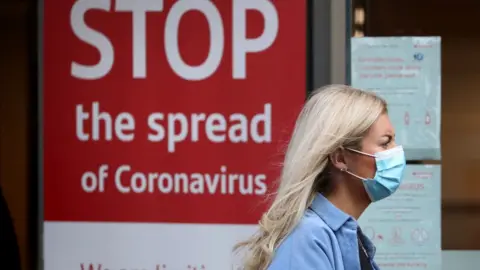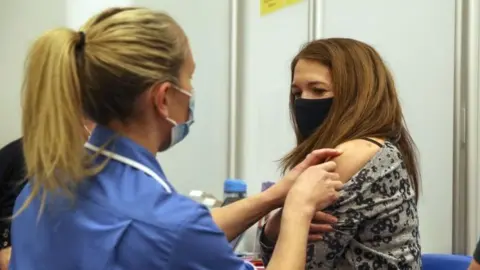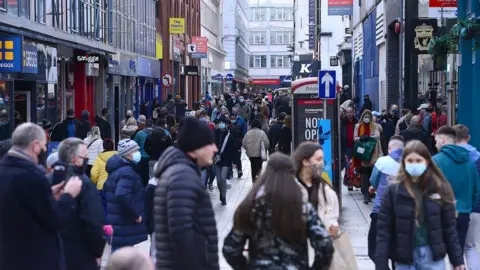Covid-19: Half of all NI cases linked to Delta variant
 PA Media
PA MediaAbout 50% of Northern Ireland's coronavirus cases are now linked to the Delta variant, BBC News NI understands.
Scientists believe it will become the dominant strain in Northern Ireland by the end of the month.
Approximately 75% of cases are expected to be linked to the strain, which was first discovered in India.
Sources say there are far too many Covid-19 clusters across Northern Ireland and the Delta variant can only be held back for so long.
The race is on between variant and vaccine.
There have been 612 confirmed or probable cases of the Delta variant in Northern Ireland, according to the Public Health Agency (PHA).
Like elsewhere in the UK, the increase in the variant was widely anticipated.
To tackle the rise in cases, BBC News NI understands mobile vaccine units are expected to be deployed to try and make access to vaccines easier for some groups, especially those aged between 18 and 30.
That may include drop in centres where an appointment is not required.
Mobile units may also be dispatched to large open spaces or university areas where younger people tend are more likely to gather.
Within the past few weeks, mobile vaccination units have opened in Glasgow in Scotland and in Harrogate in England to increase the pace of vaccination, especially in Covid-19 hotspots.
'Vaccines are working'
Hospitals in Northern Ireland have yet to be affected.
Latest official figures show there are 13 hospital in-patients being treated for Covid-19, with no cases being treated in intensive care units (ICU).
However, that picture could change over the next couple of months.
 PA Media
PA MediaThe Department of Health reported 188 new cases on Wednesday - the highest daily total in more than 100 days.
Health officials believe fewer people are developing serious symptoms because they have been vaccinated.
"The case numbers are going up and we're seeing that pattern right across the UK but we're not seeing the rise in serious illness - yet," said Dr Alan Stout, chair of the Northern Ireland General Practitioners' Committee (NIGPC).
"We're not seeing the hospital admissions and we're not seeing the deaths, so that has shown us that the vaccine is immensely successful in terms of protecting against serious illness.
"We're hoping - and this is where we need to buy that time over the next week to two weeks and into the early summer - to make sure that those patterns remain."
Dr Stout added: "We want to force the infect numbers down as well because that has other implications but it is showing us at the moment that the vaccines are working for this particular variant."
Enhanced testing
Dr Gerry Waldron of the PHA said the spread of the Delta variant "underpins the need for continued vigilance and adherence to the public health guidance".
He said the PHA has also activated "enhanced testing in areas where we have identified a number of probable cases of the Delta variant".
That includes Omagh, County Tyrone and Ballymoney, County Antrim - a total of 31 people have tested positive after the "enhanced testing" of 1,138 people in those towns.
Slightly more people in the over-60s age group are testing positive but the biggest concern is among those aged between 18 and 40.
Official information is not being released about the number of people testing positive after having received two doses of the vaccine but it is understood a small number are affected.
The vaccine does not offer 100% protection against the virus.
But as the Delta variant is causing a spike in cases and increasingly becomes the dominant strain across the UK, experts believe more people who have been fully vaccinated will develop symptoms.
Judging by the numbers in ICUs across England and Scotland, it is hoped Northern Ireland's ICUs will also not become swamped by seriously-ill people.
However that could change in the autumn and winter months when hospitals will also have to deal with the flu virus and more people experiencing respiratory problems.
 Pacemaker
PacemakerThe Northern Ireland executive is due to review lifting further restrictions on 1 July with an indicative date of easing on 5 July.
From a health perspective, officials will want to buy more time in order to get more people vaccinated.
With the Twelfth of July holidays also looming, the preference would be to leave things as they are for another few weeks.
But that could be difficult for some politicians to accept.
Allowing large get-togethers while also keeping people safe will be really tough and an even tougher one to police.
Executive went against expert advice
Meanwhile, it has emerged that the Stormont executive went against the advice of the chief medical officer and the chief scientific adviser when it decided to relax self-isolation guidance for people entering Northern Ireland from the Common Travel Area (CTA).
The CTA is made up of the UK, the Republic of Ireland, the Channel Islands and Isle of Man.
Ministers agreed to the change last month after pressure from the tourism industry.
In a response to a question in the Stormont assembly, Health Minister Robin Swann said it was his view and that of the expert advisers that the self-isolation guidance should have remained in place.
That would have "allowed time for greater vaccination roll-out and minimising any potential for community transmission" of coronavirus.
Mr Swann said the chief medical officer and the chief scientific adviser told the executive last month that removing the guidance would "accelerate the introduction of the [Delta] variant into Northern Ireland".
